8 April 2023
History in the Making
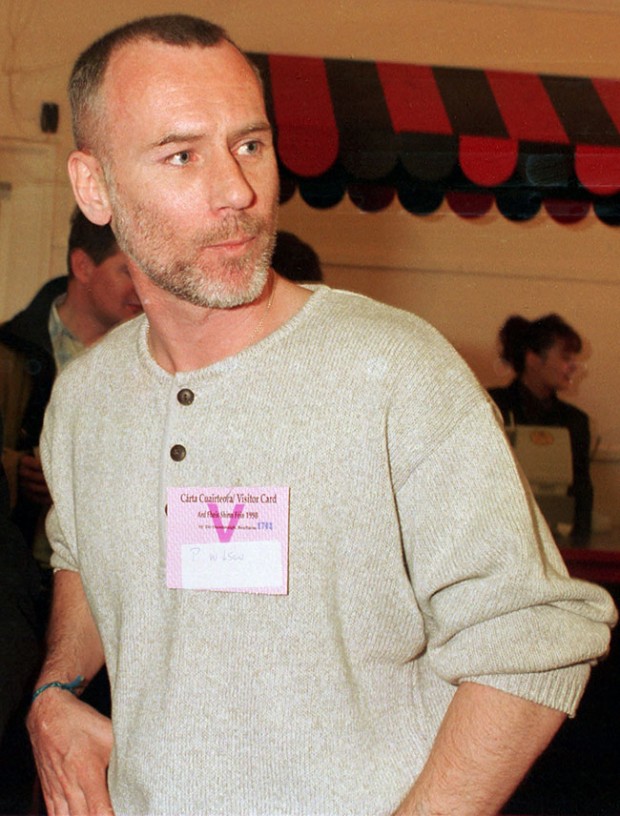
• Pádraic Wilson attending the 1998 Sinn Féin Ard Fheis
Pádraic Wilson was the Officer Commanding Republican Prisoners in the H-Blocks from 1996 to 1999. Here he writes of the key events within the prisons in the months before and after the Good Friday Agreement.
— • — • —
Following the election of the Labour Government in May and the renewal of the IRA cessation of military operations in July 1997 there were indications that a more progressive approach in relation to prisoners was being rolled out.
This was in stark contrast to the response of the Tory Government to the cessation of August 1994, which had not given much cause for optimism overall never mind in relation to prisoners.
Requests to allow delegations into the prisons had been refused. Instead ‘special’ visits were offered in the general visiting area. On 24 July, just over a week after the IRA renewed its ceasefire, a Sinn Féin delegation was given clearance to go into Maghaberry and meet with the eight republican women POWs.
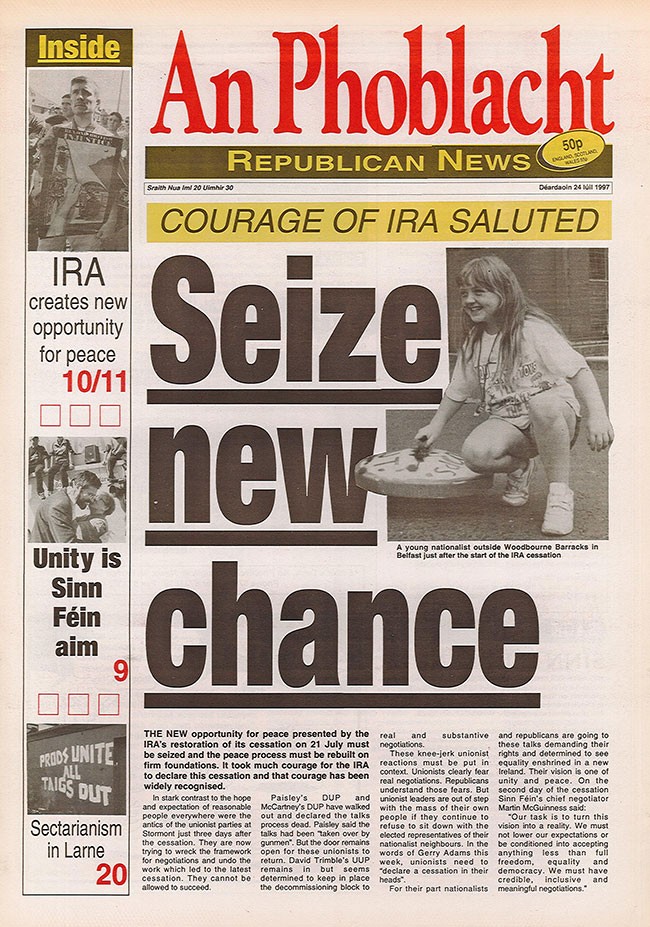
On 18 September a Sinn Féin delegation, led by Martin McGuinness, was allowed into the prison gym at the H Blocks to meet with 40 men from H3, H4 and H8. That afternoon the same delegation visited the eight women in Maghaberry.
Those engagements, although constrained by security and confidentiality concerns, still provided us prisoners with the opportunity to engage directly with those at the heart of the negotiations and afforded leadership the chance to hear our views and concerns.
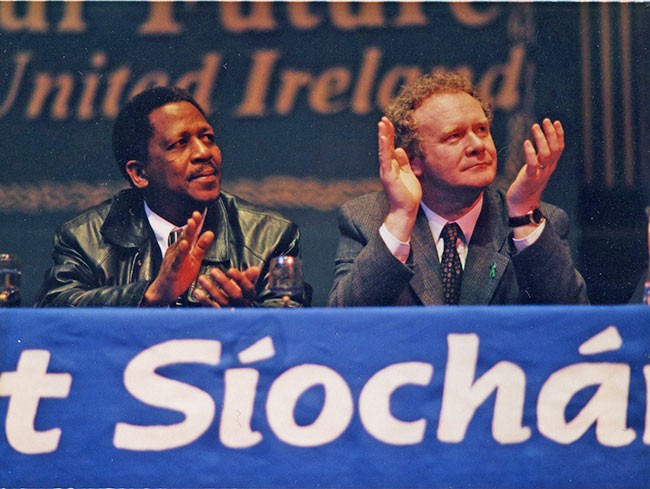
• Matthews Phosa (ANC) and Martin McGuinness
Listening to Martin and the other Sinn Féin representatives I think it’s fair to say that many of the prisoners were surprised at just how tuned in to events they themselves were. It was important for us to make it clear that as political prisoners we were not a bargaining tool. The issue of prisoners could only be resolved as part of a wider agreement. We had our own concerns and at times doubts but we trusted those who had the responsibility to give leadership and to take decisions on our behalf.
We tried our bit to ensure that the issue of prisoners remained on the agenda. In March 1997 a planned mass escape from H7 had been thwarted when a tunnel was discovered. In December 1997, just before the first Sinn Féin delegation travelled to Downing Street to meet Tony Blair, a plan to achieve the escape of Liam Averill from the H Blocks was successfully executed.
In January 1998 it was announced that British Secretary of State, Mo Mowlam, was to meet with loyalist prisoners who were threatening to withdraw their support for the talks process. I was asked by the media, who had been given access to the prison in advance of her visit, if we would meet with her.
I explained that we had not received notification of a meeting and that in any case the meetings that really mattered were with those who represented our interests on the outside. Some of the journalists were almost incredulous of the suggestion that we might not meet her. I made it clear, that out of courtesy, we would meet her or anyone else who came in to the H Blocks. However, unlike loyalism, in the real world the tail did not wag the dog. As it turned out she did ask to meet us the next day.
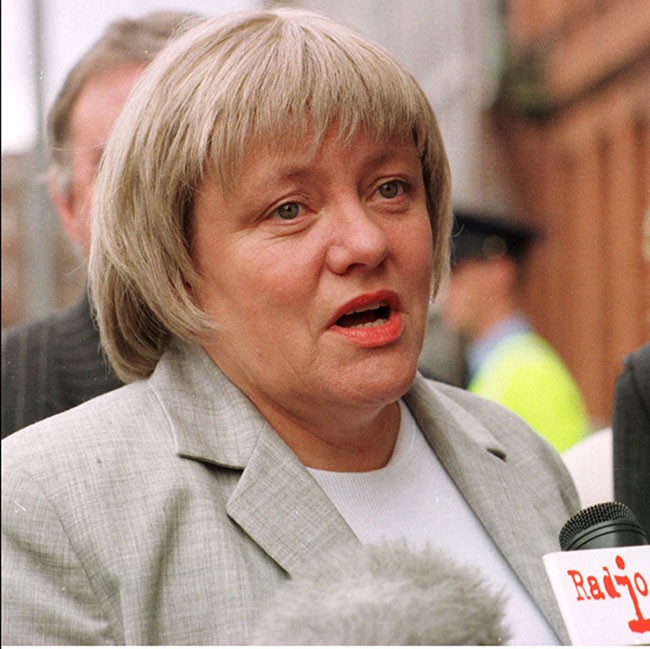
• British Secretary of State, Mo Mowlam
When the GFA was finally signed on the afternoon of 10 April the issue of prisoner releases was part of the Agreement. There was an air of expectation and excitement amongst prisoners, families and supporters. There was also a caution, given previous experiences.
On 29 April arrangements were made for another delegation to come into the H Blocks. This delegation was to be different in a number of ways. 120 men from the H Blocks would be joined by our eight women comrades from Maghaberry. The delegation was to include Sinn Féin representatives and representatives from the ANC, the Government Party in South Africa.
Gerry Kelly, Alex Maskey, Siobhán O’Hanlon, Sue Ramsey, Bik Mc Farlane and Mary Mc Ardle, made up the Sinn Féin delegation. They were accompanied by Cyril Ramaphosa, Secretary General of the ANC and its chief negotiator along with his comrade Matthews Phosa, ANC Regional Premier of the Eastern Transvaal.
Both Cyril and Matthews spoke about the importance of engaging with their own people during the negotiations between the ANC and the apartheid regime in South Africa.
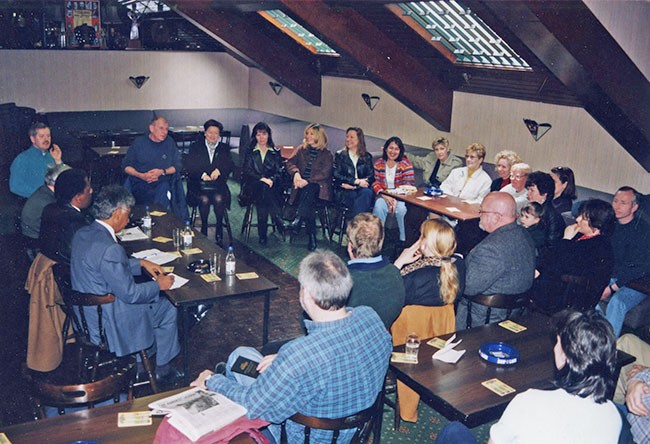
• Sinn Féin representatives and representatives from the ANC briefing prisoners relatives and support groups
During their time in Ireland, they had engaged with Republicans who had voiced concerns and reservations. Such doubts were natural. The pathway to making peace like waging struggle was paved with uncertainties.
Cyril spoke of the strong solidarity, comradeship and respect that existed between the ANC and Irish Republicans. Ramaphosa highlighted the role played by former prisoners in the South African context and urged us, upon release, to work within our communities to help people understand and become involved in the peace process. The most important negotiation would be with our own people.
Before departing the delegation shook hands and exchanged greetings with each of the POWs. There was a great feeling of comradeship and warmth in what was normally a cold and uninviting prison building.
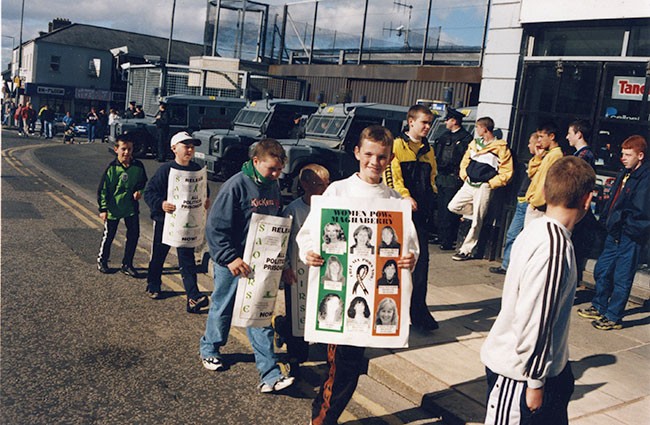
• Protest calling for the release of Irish POWs
In the months ahead, many of the 128 prisoners and the six Sinn Féin representatives gathered in the prison gym on that day went on to play key roles in the developing peace process and related negotiations.
Three of the women were elected as MLAs. One of them served as a junior minister and was later elected as an MEP. Four of the men were elected as MLAs. One of them served as a junior minister and as a member of the Policing Board. Another was elected Mayor of Belfast and later elected Speaker of the Assembly. Others were elected as Sinn Féin councillors to various Councils across the Six Counties.
Many others went on to give leadership, help develop party capacity and build political strength at local and national levels. We didn’t feel a hand on our shoulders but we did feel that we were a part of history in the making.
An Phoblacht, Issue 1, 2023, Good Friday Agreement — Special Edition, available here
Follow us on Facebook
An Phoblacht on Twitter
Uncomfortable Conversations

An initiative for dialogue
for reconciliation
— — — — — — —
Contributions from key figures in the churches, academia and wider civic society as well as senior republican figures




